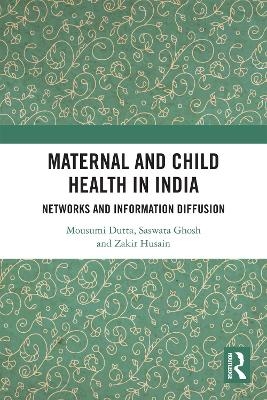
Maternal and Child Health in India
Routledge India (Verlag)
978-1-032-51474-1 (ISBN)
This book examines the process of information diffusion and the challenges of spreading awareness about maternal and child health (MCH) outcomes in India, with a special focus on Bihar – a state in eastern India.
Investing in the health of women and children results in significant and long-lasting economic and social benefits to society. Analysing the National Family Health Survey data, the volume explores the role that access to information has on the adoption of MCH practices. It also explores regional variations – between Empowered Action Group (EAG) states and non-EAG states and also across EAG states – in the impact of information networks. Using appropriate econometric methods, the authors study the role of peer effects and grass-roots health workers in bringing about a change in attitude within communities. The book looks at the process of information dissemination between the grass-roots health workers and the target women and brings to the forefront the intricacies of patriarchal family dynamics that hinder women from accessing basic maternal and child healthcare needs. Based on grass-roots experiences, the book provides sharp insights from the field for the benefit of researchers, policymakers, and activists.
Rich in empirical data, this book will be of interest to academics and researchers of development economics, public health policy and practice, community health, healthcare administration and management, primary healthcare and family practice, and health and social care.
Mousumi Dutta is Professor in the Economics Department at Presidency University, Kolkata, West Bengal, India. Saswata Ghoshis Associate Professor at the Institute of Development Studies Kolkata, Kolkata, West Bengal, India. Zakir Husain teaches in the Economics Department at Presidency University, Kolkata, West Bengal, India.
List of figures vi
List of tables vii
Acknowledgements x
1 Maternal and child health outcomes in India: Where do we stand? 1
2 Introducing the data: Secondary and primary sources 30
3 Networks and information diffusion: Evidence from national family health survey 61
4 Health communication through SHGs: Assessing the JEEViKA programme in Bihar 99
5 Leveraging information diffusion: Peer effects versus individual counselling by ASHAS 139
6 Obstacles to information networks: Results from social network analysis 202
7 Signposts for the future 239
Index 253
| Erscheinungsdatum | 10.07.2024 |
|---|---|
| Zusatzinfo | 61 Tables, black and white; 8 Line drawings, black and white; 14 Halftones, black and white; 22 Illustrations, black and white |
| Verlagsort | London |
| Sprache | englisch |
| Maße | 156 x 234 mm |
| Gewicht | 648 g |
| Themenwelt | Sachbuch/Ratgeber ► Gesundheit / Leben / Psychologie |
| Studium ► Querschnittsbereiche ► Prävention / Gesundheitsförderung | |
| Naturwissenschaften ► Geowissenschaften ► Geografie / Kartografie | |
| Sozialwissenschaften ► Soziologie ► Spezielle Soziologien | |
| ISBN-10 | 1-032-51474-4 / 1032514744 |
| ISBN-13 | 978-1-032-51474-1 / 9781032514741 |
| Zustand | Neuware |
| Informationen gemäß Produktsicherheitsverordnung (GPSR) | |
| Haben Sie eine Frage zum Produkt? |
aus dem Bereich


